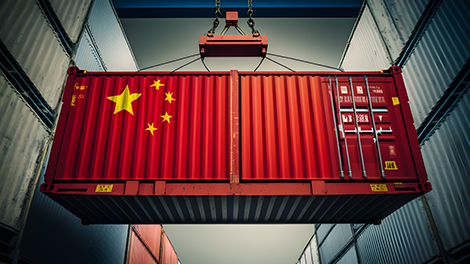In the wake of Covid-19 disruption to supply chains, the conversation about improving reliability has never been more pertinent. Nothing should be off the table for business leaders and supply chain managers, when it comes to a restructuring their logistics.
3 trending terms in the industry which epitomise this increased focus on reliability are nearshoring, reshoring and friendshoring. All 3 are possibilities worth considering for a business looking to improve the reliability of their supply chain.
This article will explain the meaning of nearshoring, reshoring and friendshoring, including the benefits and drawbacks of each as a supply chain strategy.
Nearshoring
Nearshoring is a business practice in which a company transfers some of its operations or services to a neighbouring or nearby country, typically within the same geographic region. It's a form of outsourcing, but instead of offshoring tasks to a distant country, nearshoring involves locating them closer.
The primary motivation behind nearshoring is to enjoy the benefits offered by close proximity. By moving operations to nearby countries, companies can reduce logistical costs and complexities, overcome time zone differences, and minimise cultural and language barriers that can arise when working with more distant offshore partners.
Key advantages of nearshoring compared to offshoring include:
- Increased reliability of the supply chain.
- Reduced logistics costs.
- Improved communication.
- Easier coordination.
- Potentially reduced cultural and operational differences.
- Similar time zone.
- Quicker response time.
- Increased speed to market.
- Potentially lower customs and duty charges.
Potential disadvantages to be aware of:
- Increased raw material and labour costs.
- Reduced availability of suppliers.
- Economic instability in the new location.
- Potentially a reduced quality of product.
Reshoring
Reshoring, also known as onshoring or backshoring, is the practice of bringing back business operations or manufacturing processes that were previously offshored or outsourced to a foreign country and relocating them domestically. In other words, it involves the reversal of the offshoring process.
The decision to reshore is often driven by several factors. Companies may choose to reshore their operations due to changes in economic conditions, such as rising labor costs in the offshore location, changes in currency exchange rates, or increased transportation and logistics expenses. Concerns about intellectual property protection, quality control, supply chain disruptions, and the desire for closer proximity to customers and markets can also influence the decision to reshore.
Reshoring can have several potential benefits for companies and the domestic economy:
- Increased reliability of the supply chain.
- It can help create jobs in the home country.
- Reduced product emissions.
- Faster speed to market.
- Support local suppliers and businesses.
- Reduce lead times and supply chain costs.
- Enhance control over intellectual property and quality standards.
- Improve communication and collaboration between teams.
- Remove customs and duty charges.
- No exposure to currency exchange rates.
However, reshoring is not always a straightforward process. There are challenges associated with re-establishing operations domestically:
- Increased raw material and labour costs.
- The need to invest in infrastructure.
- Retraining or hiring a skilled workforce.
- Navigating regulatory and legal considerations.
- Certain industries may still find it more cost-effective or strategically advantageous to maintain some level of offshoring or global sourcing.
Friendshoring
"Friendshoring" is a relatively new term in the business context and does not have a widely recognised definition.
In a broad sense, "friendshoring" refers to the practice of conducting business or outsourcing tasks to countries that are geopolitical allies. Some companies and governments pursue friendshoring as a way to continue accessing international markets and supply chains while reducing certain geopolitical risks.
It's a term which as appeared off the back of recent geopolitical tensions between the US and China. The two biggest economies in the world are deep trading partners, but geopolitically opposed. Consequently, shippers in both nations have faced challenges sourcing products from the other.
Advantages of friendshoring:
- Increased reliability of the supply chain.
- Mitigate supply chain risk stemming from geopolitical tensions.
Disadvantages of friendshoring:
- Increased raw material and labour costs.
- Reduced availability of suppliers.
- Potentially lower growth over time.
- Concerns about its impact on global free and fair trade.
In Summary
Nearshoring, reshoring and friendshoring are all valid strategic choices for businesses looking to improve the reliability of their supply chains. However, it's essential to carefully weigh the advantages and disadvantages and consider the specific requirements of the project or tasks before making a decision.
It could be the case that a mixture of all 3 is the ideal solution to support your business goals. Restructuring your entire supply chain might be too disruptive for the business, but adding suppliers in different locations may be an effective way to mitigate risk. We have a separate article on the benefits of supplier diversification vs contraction, which you can see below.
At WTA, we pride ourselves on matching decades of experience in supply chain management with high quality service, backed up by our impressive Trustpilot rating. Finding supply chain optimisations is a core focus of all our key accounts, which is why over 50% of them have been with us more than 5 years.
To start a conversation about optimising your supply chain beyond looking at freight rates, reach out to Liam Launders below, who has been doing it for more than 15 years.

Liam Launders,
Head of Sales, WTA Group.
Tune into Freight Club!
Tune into the WTA Freight Club podcast, where host Scott Wallis discusses how moving attention away from the freight rate can actually boost profitability!
Listen to the episode here to discover the latest advice.









